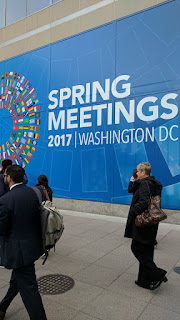In April, 2000, 10,000 protesters gathered outside the World Bank/IMF Spring Meetings to express passionate disapproval of globalization and to express concern about growing income inequality.
Chaos erupted and upwards of 1,000 people were arrested. Seventeen years later, at this year’s World Bank meetings, there are no protesters to be found in Foggy Bottom. The World Bank has attempted to incorporate some of the protesters’ concerns into their Spring Meeting event schedule: they have increasingly emphasized income inequality and other issues. This progress was displayed at the Civil Society Organization (CSO) Roundtable on April 18: CSOs posed their questions directly to World Bank executive directors.
The questions were direct, opening with “How can the bank do more to provide relief in wars and other crises?” Executive director Merza Hasan brought attention to the relief efforts of the past, but suggested there was room for improvement. The comments were in line with World Bank President Jim Yong Kim’s comments at the London a School of Economics last week.
Another CSO delegate discussed the internet shutdown in southern Cameron and the role the World Bank should play in pressuring the Cameroonian government. Mr. Hasan contended that access to information must be a right for all people. The economic record has shown the importance of access to information and to the internet's role in creating healthy democracies, institutions and growth. It is thus imperative that the World Bank and other multilateral institutions continue to support an open internet.
The second session focused on funding of CSOs and aid to developing countries. The last ten years have seen a decline in foreign aid and a frantic search for alternative funding. The World Bank has a role to play here in helping organize a focused development finance strategy and in ensuring investment quality over quantity.
Illicit transfers out of developing countries further exacerbate the funding issue. It is estimated that for every dollar in aid going to Africa, one dollar flows outwards in illicit transfers. The delegates suggested the need to pressure both developing and developed countries to limit these transfers.
Finally, CSO delegates insisted that the World Bank only finance environmentally sustainable projects. The Bank has made this a stated goal, but revelations last year showed that private banks in Bangladesh and Indonesia who received funding from the International Finance Corporation (the World Bank’s private sector arm) funded coal projects. This was rather indirect funding, however, and it appears that there have not been regular occurrences of this kind in recent years. Still, the World Bank can help discourage coal plant investments whose short term costs are cheaper than solar, but whose intergenerational costs are more expensive in the long run.
Additional events throughout the week will hopefully provide further discussion of these and other issues.
Chaos erupted and upwards of 1,000 people were arrested. Seventeen years later, at this year’s World Bank meetings, there are no protesters to be found in Foggy Bottom. The World Bank has attempted to incorporate some of the protesters’ concerns into their Spring Meeting event schedule: they have increasingly emphasized income inequality and other issues. This progress was displayed at the Civil Society Organization (CSO) Roundtable on April 18: CSOs posed their questions directly to World Bank executive directors.
The questions were direct, opening with “How can the bank do more to provide relief in wars and other crises?” Executive director Merza Hasan brought attention to the relief efforts of the past, but suggested there was room for improvement. The comments were in line with World Bank President Jim Yong Kim’s comments at the London a School of Economics last week.
Another CSO delegate discussed the internet shutdown in southern Cameron and the role the World Bank should play in pressuring the Cameroonian government. Mr. Hasan contended that access to information must be a right for all people. The economic record has shown the importance of access to information and to the internet's role in creating healthy democracies, institutions and growth. It is thus imperative that the World Bank and other multilateral institutions continue to support an open internet.
The second session focused on funding of CSOs and aid to developing countries. The last ten years have seen a decline in foreign aid and a frantic search for alternative funding. The World Bank has a role to play here in helping organize a focused development finance strategy and in ensuring investment quality over quantity.
Illicit transfers out of developing countries further exacerbate the funding issue. It is estimated that for every dollar in aid going to Africa, one dollar flows outwards in illicit transfers. The delegates suggested the need to pressure both developing and developed countries to limit these transfers.
Finally, CSO delegates insisted that the World Bank only finance environmentally sustainable projects. The Bank has made this a stated goal, but revelations last year showed that private banks in Bangladesh and Indonesia who received funding from the International Finance Corporation (the World Bank’s private sector arm) funded coal projects. This was rather indirect funding, however, and it appears that there have not been regular occurrences of this kind in recent years. Still, the World Bank can help discourage coal plant investments whose short term costs are cheaper than solar, but whose intergenerational costs are more expensive in the long run.
Additional events throughout the week will hopefully provide further discussion of these and other issues.
